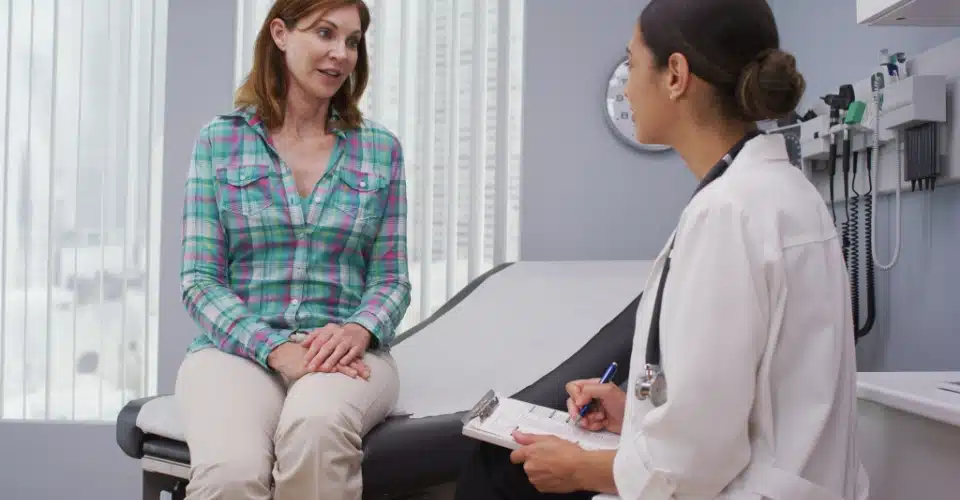Questions About a Workplace Injury?
Call an Experienced Work Injury Lawyer Today to Review Your Case and Explain Your Options for Seeking the Benefits You Deserve!

When a work-related illness or injury makes it impossible to work, workers’ compensation benefits can provide much-needed financial stability. But how long will the insurance company have to pay your wage loss benefits and medical bills?
It depends.
In an ideal world, if you are injured at work, your medical expenses and time off would be covered by your employer’s insurance in full. Unfortunately, workers’ compensation law can be a tricky trail to navigate, and the rules vary from state to state. In this article, our experienced workers’ compensation attorneys break down what you can expect—and what you should do if the insurance company wrongfully terminates your benefits.
Broadly, you should receive workers’ compensation benefits as long as you are suffering from the effects of a work-related illness or injury—or until you settle your claim. But it’s never that simple.
Before we dig into the details, let’s consider some factors that might impact your case:
Workers’ compensation has its own language, and it can be confusing. You’ll see some technical terms in this article, and you need to know what they mean.

Again, the insurance company should pay your medical bills as long as you need treatment for your work-related injuries or illness. But different rules apply to wage loss benefits.
In Kentucky, the maximum duration of your wage loss benefits depends on the severity rating of your injury or disability, and potentially (in the case of total disability) your age and when the injury occurred.
Injured workers with permanent partial disabilities will be given a permanent disability rating below 100%.
In any case, benefits will ultimately terminate once you either reach age 70, or 4 years after your injury or last exposure—whichever is later. This is true even if you are receiving partial permanent disability benefits but have not reached the 425 or 520-week cutoff.
Kentucky does not officially recognize temporary partial disability.

In the State of Indiana, how long income benefits last also depends on the severity of your injuries. For workers who cannot perform any work (temporary total disability or permanent total disability), benefits will be paid for up to 500 weeks.
Partial disability is a little more complicated.
For workers who are able to return to lower-paying work due to a temporary partial disability during their recovery, benefits will be paid for up to 300 weeks. This 300-week limit also includes any time spent receiving temporary total disability benefits, so if you were totally disabled for 100 weeks, you could only receive up to 200 weeks of temporary partial disability.
Permanent total disability, on the other hand, will be paid as a lump sum based on the severity of the impairment, according to state guidelines.
When livelihoods are at stake, it’s best to be as informed as possible. This book covers several critical questions people have when it comes to workers’ compensation claims. It exposes workers’ comp myths, mistakes to avoid, and what to consider when hiring a workers’ comp lawyer.
10 Common Mistakes in Workers’ Compensation Claims
While rest and recuperation are important after an injury, many injured workers are anxious to get back to work when their health starts improving. Since workers’ comp benefits will only cover a portion of your pre-injury salary, there is a strong financial incentive for healthy workers to return.
To be clear, this is the way the workers’ compensation system is intended to work. If you are no longer disabled, your benefits will end.
But there is such a thing as returning too soon. Workers who go back before they’re truly ready—or been cleared by their medical team—potentially risk reinjuring themselves, losing their eligibility for future benefits, or even being fired.
Here are a few important things to keep in mind.
You should never return to work if doing so would be risky or detrimental to your health and well-being. You should always carefully follow your doctor’s treatment plans, wait until you reach maximum medical improvement, and you’ve been cleared to return by your medical team.
Sometimes, your employer or the insurance company might say you are fit to return to work, but your own doctor doesn’t agree. In this case, speak with an experienced attorney about your legal options. You will have the right to appeal the insurer’s decision, but the process can be complicated.
The workers’ compensation insurance company wants to stop paying you as quickly as possible, but your return-to-work timeline is between you and your doctor. Be sure to hold a firm line if you feel you are being pressured by your employer or their insurance carrier. Returning to work too soon could be detrimental to your health and could result in reinjury.
Call an experienced workers’ compensation lawyer if you need assistance. We can help you navigate the process of claiming your benefits and returning to work when the time is right.
All parties involved in the workers’ compensation claim should be kept in the loop during the course of your recovery. This includes your doctor, your employer, and the insurance company.
Your doctor should have all available information about your recovery so they can make informed decisions about your health. Be sure to update them with anything new or notable about your condition.
Your employer should also be kept in the loop, so they know what to expect upon your return. When the time comes, your employer should be prepared to take you back either into your old position or something more suited to your health and condition. You may have medical restrictions at first, or for the long term. Your employer won’t appreciate being surprised by those on your first day back.
The workers’ compensation insurer paying your benefits should also be aware of your return-to-work plans. They should know you will not be returning until you are cleared by your doctor and any exceptions or restrictions your doctor might give. You may still be eligible for benefits if you return to light duty or a lower paying job than the one you had before.
If you communicate well, the transition back to work should be an easy one for everyone involved. But if you’re unsure how to navigate the path, or you feel that your employer or insurance company isn’t treating you fairly or is pressuring you to do anything you aren’t comfortable with, call an experienced and empathetic attorney like Karl Truman to help guide you through.
RELATED POST: Can I Get a Settlement From Workers’ Comp if I Go Back to Work?

Often after a work-related injury the insurance company will assess the situation and make an initial offer of coverage based on medical expenses, lost wages, and other factors. The injured person will need to accept that offer to begin receiving benefits. If the injured person does not feel the offer is fair or acceptable, they may choose to hire a lawyer to try and negotiate a settlement instead.
This is a risky move, but it can pay off in some cases. An experienced legal team can help evaluate your individual case. If your case is strong you may end up with a significantly higher payout, but if the insurance company has a stronger case you might end up with less than the original offer.
You must also consider how a settlement would be paid. You may end up with a lump sum of money, or structured payments over time. Depending on your situation and the costs you need to cover, you may opt for one or the other.
If you don’t agree with an adjuster’s decision to terminate or reduce your benefits, contact a workers’ compensation lawyer right away. Insurance companies sometimes make decisions based on their best interests, not yours. Other times, there might be a legitimate disagreement about your ability to return to work.
A lawyer can help you understand your rights, build your case, negotiate with the insurance company, and present your side of the story at court. Our law offices in Kentucky and Indiana offer free consultations, so you can get the information you need from a trusted expert.
If you are overwhelmed by the complexities of workers’ compensation law and need help sorting through your individual case, please give Truman Law Office a call to request a free consultation.
It’s important to understand that your employer and the workers’ compensation insurance company may not have your best interests at heart. They may pressure you to return to work too early. Their preferred doctors may provide partial disability assessments that undervalue the true extent your impairments. They may unfairly deny your claim. Working with an experienced workers’ compensation attorney helps ensure that you get all the benefits that you are entitled to, for as long as you are entitled to receive them.
To request your free case review, please call our team at (502) 222-2222 or contact us to schedule your free consultation with an experienced workers’ compensation attorney.
References
Kentucky Revised Statutes 342.730
Indiana Code 22-3-3
The content provided here is for informational purposes only and should not be construed as legal advice on any subject.
















Disclaimer: Kentucky does not certify specialties in legal fields. The personal injury law information on this website provided by The Karl Truman Law Office is not meant to be taken as formal legal advice. If you need to speak with a personal injury attorney in the Louisville, Kentucky, or Jeffersonville, Indiana areas please contact us today.This website is not intended for viewing or usage by European Union citizens.
Terms & Conditions for SMS communication: Karl Truman Law Office will use SMS communications to contact those that have inquired about our services which include all practice areas listed on our site. Attempts to contact will cease after one month unless a case is accepted and signed with the Karl Truman Law Office, in which case we will continue to utilize our SMS feature for appropriate communications. Should there be any questions or concerns about our SMS communications, please call our office at 502.222.2222 or email us at [email protected]. You may opt out of these communications at any time by reply with STOP. Message and data rates may apply.
